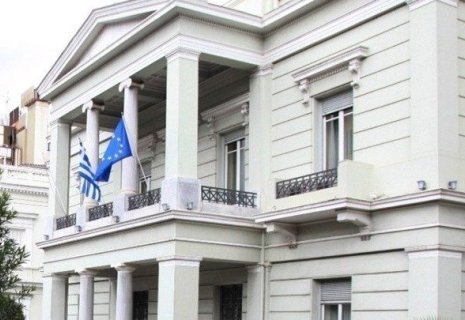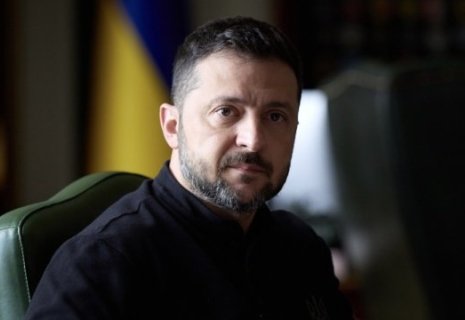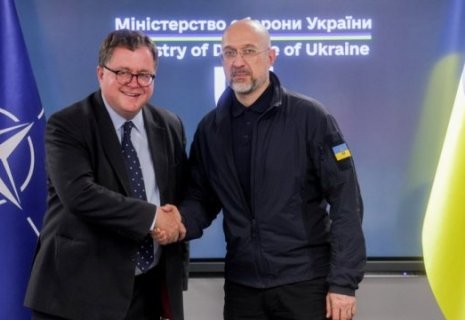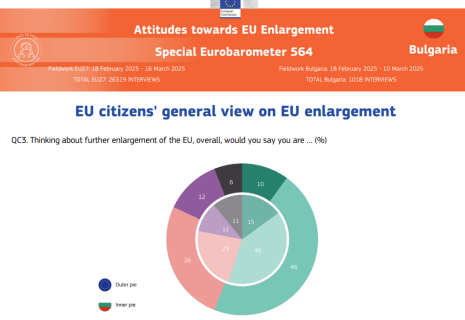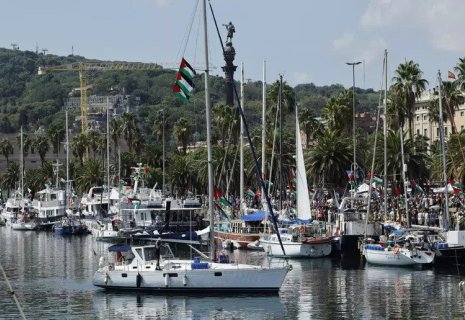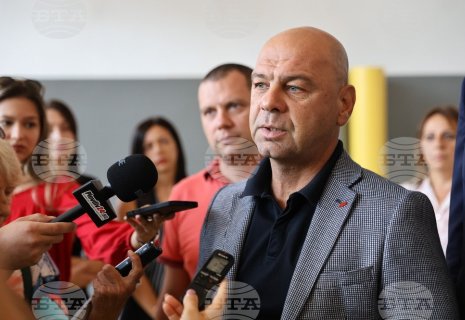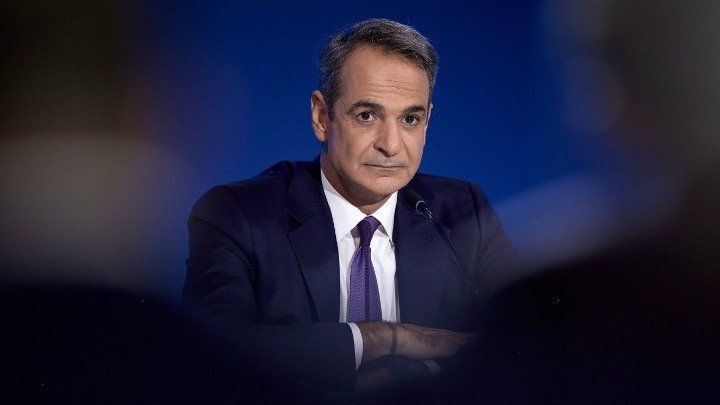
Mitsotakis: Greece’s strategy not subject to Turkiye’s approval
Prime Minister Kyriakos Mitsotakis began his press conference at the 89th Thessaloniki International Fair (TIF), transmitted live on YouTube from the Ioannis Vellidis Conference Centre, at noon on Sunday, CE Report quotes ANA-MPA.
He replied to questions about the '13th salary' in the public sector by noting the following:
"The announcements I presented constitute the boldest reform of the income scale in post-junta history. Greece is now the exception to the rule. Most European countries are being forced to impose austerity measures. We are in the opposite position. The 1.7 billion euros cannot be any greater ecause we would break fiscal rules. The sum to share out is this. We have chosen to aim at a generous tax reform. A 13th salary would cost 1.3-1.4 billion [euros]. If someone believes that the fiscal surplus should go there let them say so. I hope that the policy of generating robust surpluses will continue next year as well. All citizens have contributed and now is the time for the growth dividend to return fairly to as many of our fellow citizens as possible."
In response to a question about population ageing and decline, and whether the tax breaks will be for the income of 2025 or 2026, as well as high prices, Mitsotakis noted that the reforms announced had specific aims.
"We want to support families with children. Let me clarify that tax-payers will see this improvement in income from the first salary of the following year and every month. For young men and women what we announced is a radical change. What we did is very bold. To say zero tax could be one or two salaries. We want young people to enter the labour market early. Obviously I spoke about high prices several times in my speech. The benefit for households, for young people, for pensioners, for all Greeks is significant and this is the response to high prices. Obviously, the battle against high prices is not restricted to only enhancing income but also with actions. I insist that what we are doing is giving more money into the pockets of households. There are also measures amounting to 1.5 billion [euros] that the citizens have not yet become aware of. All tenants will receive on month's rent and all pensioners a benefit," he said.
The prime minister ruled out any change to electoral law, repeating his firm belief in single-party governments, while noting that elections were still some way off.
Mitsotakis: The Greece-Cyprus electricity interconnection is important and will primarily benefit Nicosia
Mitsotakis chose to respond to questions about the latest developments in connection with the Greece-Cyprus electricity interconnector and the relevant investigation by a public prosecutor by focusing on the fact that this was an important project that would mainly benefit Cyprus.
He noted that Cyprus was isolated in terms of energy and that this prospect had been selected by the European Union for this precise reason.
"Our intention is for this project to begin and be completed but, obviously, Cyprus must actively prove that it wants this project," he added. Mitsotakis pointed out that the Cyprus interconnection was not the only high-priority project of this kind, noting those to connect Crete, the Dodecanese islands and Egypt.
There would soon be "clear visibility from Cyprus that it wants this project and means it," he predicted, allowing it progress to the next stage.
The next question concerned the battle against criminality and the latest revelations about organised crime ring on Crete, with the prime minister responding that "this battle is being won every day," and referring to the successes of the “ Greek FBI”.
He emphasised that when we talk about illegality, we’re not only referring to hard organised crime, but also highlighted the importance of addressing corruption in the public sector and street-level crime.
Regarding the migration issue and what the government intends to do to address potential new migration flows, Mitsotakis gave a brief overview of the government's migration policy since 2019 and highlighted that the EU now fully aligns with Greece’s positions on border protection and cracking down on smuggler activity. He noted that the temporary suspension of visa processing for migrants from Libya was an effective policy, and emphasised that the best overall proof of the results of the government's stricter but balanced migration policy is that unlike in other countries, migration is not currently the top issue of public debate in Greece alongside inflation.
He stressed: "We will insist on this policy," which is combined with a measured implementation of legal migration policies. He added: "I support organised, legal migration," and announced that a relevant bill will be introduced in the coming months.
He also stated that no decision has yet been made on whether the suspension of asylum application processing from Libya will be extended.
Greece's planning is not subject to Turkiye's approval
Answering a question about Greek-Turkish relations, the prime minister stated:
"I seek calm waters, but from a position of strength and confidence, without ever compromising on our national interests, sovereignty, or sovereign rights. And I believe that, compared to where we were a year ago, things have changed significantly in this area."
"Greece’s strategic planning is not subject to Turkiye’s approval," he emphasised.
"And I think we’ve proven that in practice. I will continue to talk with [Turkish President Recep Tayyip] Erdoğan, to keep communication channels open, and to be very honest with him about the issues that concern us," he noted, underlining that as long as the casus belli exists, Turkiye will not participate in the Safe programme.
Regarding the issue of inflation and high prices, Mitsotakis stressed that reducing VAT does not lead to lower prices.
There is a full programme for the housing crisis, exceeding six billion euros
Prime Minister Kyriakos Mitsotakis outlined the government's action against the housing crisis and to address low birth rates in response to questions during the press conference at the 89th Thessaloniki International Fair on Sunday.
He noted that the housing issue of recent years was the outcome of a fast-growing economy, which created problems for those renting and potential buyers, while benefiting property owners. He pointed out that the government has presented a "structured and comprehensive programme exceeding six billion euros", through which 30,000 Greek citizens had acquired a home, while noting that this was not the only solution available.
"We have many apartments that are unused. It seems that the restrictions on new short-term leases in the centre of Athens has had results and I am open to extending it. We have state-owned property. We see local communities, private individuals, in many areas adding housing. The rent subsidy for young people is very important," he added.
Regarding population ageing and declining birth rates, he noted that this was a complex problem that was not confined to Greece but shared by all the western world, noting that Greece's national strategy extends in many directions. These included maternity benefits, childcare vouchers and tax breaks for families. He also pointed out that the issue equally concerned the elderly and expressed satisfaction with the response to the taxation of pensioners who choose to work, while noting that financial support for families "must be on the front line".
PM's press conference at 89th TIF: On Gaza, St Catherine's Monastery at Sinai and support for poorer households
Prime Minister Kyriakos Mitsotakis responded to various sundry questions during the press conference at the 89th Thessaloniki International Fair on Sunday, on issues ranging from domestic politics to international developments.
Regarding the events in Gaza, he pointed out that Greece's strategic alliance with Israel "had not prevented us from criticising what is happening in Gaza and insisting on a two-state solution. This is the government's position and this is our public stance. The inconceivable humanitarian crisis in Gaza must stop. The Greek Government will recognise the state of Palestine," he said.
He also expressed the hope that current political problems in France will soon be overcome.
Regarding the Monastery of St. Catherine at Sinai, Mitsotakis said that this ecclesiastical matter was heading toward a resolution with the assistance of the Greek government, while procedures for the succession of the archbishop had begun with his own agreement.
"We have a strategic relationship with Egypt. We are working systematically and I do not think that we are far from signing an agreement that will also be signed by the new archbishop. Its Greek-Orthodox nature cannot change," he said.
Regarding farmers, he said the future looked hopeful, with goals such as cheap electricity largely already accomplished, while warning that some tough decisions will have to be made concerning the use of water, its amount and how it is to be managed.
In response to a question from the Athens-Macedonian News Agency (ANA-MPA) during the press conference at the 89th Thessaloniki International Fair (TIF), regarding the fact that, according to Eurostat data for 2024, 46% of Greeks cannot afford to take a one-week vacation per year and what the government intends to do to improve access, the prime minister replied that this figure does not reflect reality.
He noted that according to the same indicator in 2008, the year before the crisis, 50% of Greeks reported they couldn’t afford a vacation.
"The data we have at our disposal does not confirm what you are referring to. That doesn't mean there aren't fellow citizens who are unable to take a vacation - but it’s not to the extent suggested by the numbers being presented."
"That is why we have so many programmes like social tourism, 'Tourism for All'; that’s why we are trying to extend the tourist season to give citizens more flexibility to travel during times when costs are lower. That’s also why we fought to keep ferry ticket prices at the same levels as before.
Of course, there are destinations in our country that are very expensive - but that happens everywhere in the world. Fortunately, there are still many destinations - both on islands and in mainland Greece - where the cost of holidays is affordable for the average Greek family,” he said.
He emphasised that the government will continue to support those who cannot afford holidays through social tourism programmes, and that improving disposable income is clearly a central pillar of the government's policy, impacting all aspects of an average household's activities.



